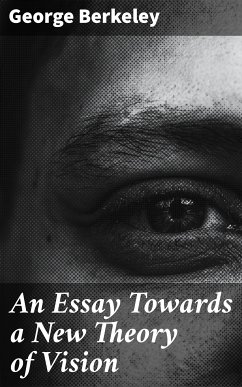In "An Essay Towards a New Theory of Vision," George Berkeley delves into the intricate relationship between perception and reality, challenging established notions of vision and its dependence on physical objects. Employing a combination of empirical observation and philosophical argumentation, Berkeley articulates his innovative theory that our understanding of distance, size, and shape is fundamentally shaped by visual experience rather than a direct correspondence to external forms. This work is notable for its clarity and precision, employing a form of writing that balances rigorous analysis with accessibility, situating Berkeley within the broader context of early modern philosophy, particularly in relation to empiricism and metaphysics. George Berkeley, an Irish philosopher and bishop, was a pioneering figure in the development of idealism and is often linked to the early stages of modern philosophy. His interest in the nature of perception can be traced back to a lifelong engagement with questions regarding reality and its representation. Throughout his career, Berkeley remained steadfast in his belief that vision is a constructive process, influenced by the observer's experience rather than mere sensory input, illuminating the philosophical debates of his time regarding the existence of the material world. Readers interested in the intersection of philosophy and perception will find Berkeley's work both thought-provoking and essential. This essay invites readers to reconsider their understanding of sight and reality, ultimately encouraging a deeper inquiry into the nature of human experience. Berkeley's arguments resonate with contemporary discussions in philosophy and cognitive science, making this book a timeless resource for anyone seeking to explore the complexities of vision. In this enriched edition, we have carefully created added value for your reading experience: - A succinct Introduction situates the work's timeless appeal and themes. - The Synopsis outlines the central plot, highlighting key developments without spoiling critical twists. - A detailed Historical Context immerses you in the era's events and influences that shaped the writing. - An Author Biography reveals milestones in the author's life, illuminating the personal insights behind the text. - A thorough Analysis dissects symbols, motifs, and character arcs to unearth underlying meanings. - Reflection questions prompt you to engage personally with the work's messages, connecting them to modern life. - Hand-picked Memorable Quotes shine a spotlight on moments of literary brilliance. - Interactive footnotes clarify unusual references, historical allusions, and archaic phrases for an effortless, more informed read.
Dieser Download kann aus rechtlichen Gründen nur mit Rechnungsadresse in A, B, BG, CY, CZ, D, DK, EW, E, FIN, F, GR, H, IRL, I, LT, L, LR, M, NL, PL, P, R, S, SLO, SK ausgeliefert werden.









